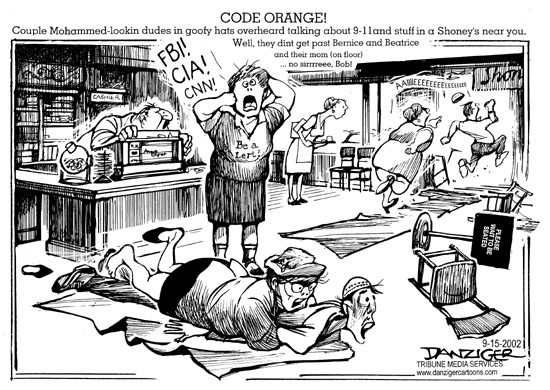Collected Quotes
March 27, 2005

©1943 SEPS, Curtis Publishing
In 1912, feminist Margaret Sanger was arrested for giving a lecture on birth control. Trade union meetings were banned. Peaceful protesters opposing U. S. entry into World War I were jailed. In 1923, author Upton Sinclair was arrested for trying to read the text of the First Amendment at a union rally. It was in response to the excesses of this period that the ACLU was founded in 1920.
American Civil Liberties Union Briefing Paper (1997)
No official, high or petty, can prescribe what shall be orthodox in politics, nationalism, religion, or other matters of opinion. 30
U.S. Supreme Court Justice Robert Jackson, in West Virginia State Board of Education v. Barnette (1943)
The Web site you are attempting to visit has been restrained. 157
A message from the United States District Court for the Western District of Pennsylvania and the Drug Enforcement Administration, displayed at 11 Web sites advertising drug paraphernalia (March 9, 2003). Although the sites were seized by the DEA under criminal forefeiture proceedings, they have not been shut down. According to a United States Attorney, visitors are not being tracked.
Stephen Downs, 61, of Selkirk, New York was arrested Monday on a trespassing charge after wearing a T-shirt saying “Peace on Earth” and “Give Peace a Chance” in Crossgates Mall. 158
Associated Press (March 11, 2003)

Wal-Marts are private property. This means that Wal-Mart has the right to ask you to leave their premises if they do not approve of your behavior. The situation is trickier on sidewalks and parking lots owned by Wal-Mart. Though these spaces are technically private, some courts will still protect your free speech rights there because traditionally they are “public” forums. The Supreme Court explicitly left this issue up to the states in Pruneyard Shopping Center v. Robins, after which states have differed in their conclusions, most falling on the side of protecting property. The state decisions have focused on large shopping malls that have taken over the traditional functions of a downtown’s Main Street.The states of Alaska, California, Colorado, Massachusetts, New Jersey, and Oregon have all made rulings that favor protecting free speech on these types of private property. Arizona, Connecticut, Georgia, Michigan, New York, Ohio, Pennsylvania, South Carolina, Washington, and Wisconsin courts have all ruled against protecting speech in these situations. Most states are still undecided on this issue, but lean towards the majority view that speech is not protected on private property. (emphasis added) 159
National Labor Committee In Support Of Worker And Human Rights (March 9, 2003)
“You mean, it’s the content of my sign?” I asked him. He said, “Yes, sir, it’s the content of your sign.” 163
Brett Bursey, before his arrest by airport police in Columbia, SC (October, 2002). Bursey was told he was trespassing, but was later charged by United States Attorney J. Strom Thurmond, Jr. for being in an area restricted by the Secret Service to protect President Bush. Bush supporters in the area were not arrested.
I am not an advocate for frequent changes in laws and Constitutions, but laws must and institutions must go hand in hand with the progress of the human mind. As that becomes more developed, more enlightened, as new discoveries are made, new truths discovered and manners and opinions change, with the change of circumstances, institutions must advance also to keep pace with the times. We might as well require a man to wear still the coat which fitted him when a boy as civilized society to remain ever under the regiment of their barbarous ancestors. 178
Thomas Jefferson, as inscribed on the Jefferson Memorial
Though I have many reservations about Thomas Jefferson, I much prefer his 18th-century view of constitutional interpretation to that with which Justice Scalia would like to saddle us in the 21st. 178
Roger Wilkins, professor of history at George Mason University
Footnotes
30 West Virginia State Board of Education v. Barnette, 319 U.S. 624, 63 S. Ct. 1178 (1943).
157 “Eminent Domain: Seizing Web Sites,” Tina Kelley, The New York Times, March 9, 2003, pg. WK5.
158 “Group Protests New York Peace T-Shirt Arrest,” Associated Press, March 5, 2003.
159 “Your Right To Free Speech At Wal-Mart,” National Labor Committee In Support Of Worker And Human Rights, New York, NY, March 9, 2003.
163 “A Flashback to the 60’s for an Antiwar Protester,” Leslie Eaton, The New York Times, April 27, 2003, pg. 15.
178 “Justice Scalia and the Life of Laws,” The New York Times, March 27, 2005, Section 4, pg. 10.
Reply
You must be logged in to post a comment.